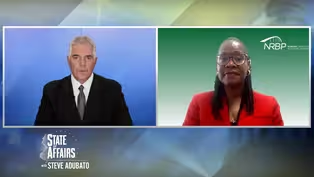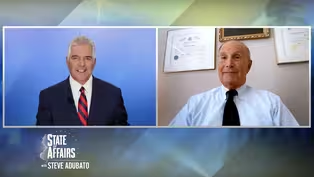State of Affairs with Steve Adubato
Investigating pandemic preparedness and growing polarization
Clip: Season 9 Episode 17 | 9m 31sVideo has Closed Captions
Investigating pandemic preparedness and growing polarization
Steve Adubato sits down with David Alland, MD, Director of The Public Health Research Institute and Professor and Chief of Division of Infectious Disease at Rutgers New Jersey Medical School, to investigate pandemic preparedness and the growing polarization of public health.
Problems playing video? | Closed Captioning Feedback
Problems playing video? | Closed Captioning Feedback
State of Affairs with Steve Adubato is a local public television program presented by NJ PBS
State of Affairs with Steve Adubato
Investigating pandemic preparedness and growing polarization
Clip: Season 9 Episode 17 | 9m 31sVideo has Closed Captions
Steve Adubato sits down with David Alland, MD, Director of The Public Health Research Institute and Professor and Chief of Division of Infectious Disease at Rutgers New Jersey Medical School, to investigate pandemic preparedness and the growing polarization of public health.
Problems playing video? | Closed Captioning Feedback
How to Watch State of Affairs with Steve Adubato
State of Affairs with Steve Adubato is available to stream on pbs.org and the free PBS App, available on iPhone, Apple TV, Android TV, Android smartphones, Amazon Fire TV, Amazon Fire Tablet, Roku, Samsung Smart TV, and Vizio.
Providing Support for PBS.org
Learn Moreabout PBS online sponsorship- We're now joined by Dr. David Alland, who is Director of the Public Health Research Institute at Rutgers New Jersey Medical School.
Doctor, thank you for joining us again.
For those who watch... Another interview we do with the doctor, I cut him off at the end of the program.
We were talking about being prepared for the next, if and when there's another pandemic.
And you said, to put things in context, we are less prepared than we were in March of 2020.
Recap for those who missed that interview, why we're less prepared, and then I wanna talk to you about distrust in the public health system that so many Americans seem to have right now.
- The reason why I'm very worried about preparedness is that there's been a lot less support for public health, both in the opinion of the United States people, but also in terms of financial support.
There have been serious cuts to the Center for Disease Control and Prevention.
There has been elimination of entire laboratories that can confirm when diseases are present.
There's websites that have gone down.
There's generally less support to public health.
People who work in public health don't get paid a lot, they work very hard.
One of the (indistinct) rewards for that is that you expect that people appreciate what you do, and what had happened instead during COVID was they got death threats.
So a lot of good people have left the public health sphere.
Again, there's a lot less support and less money there used to be.
And we haven't learned from our mistakes too.
So one of the big problems we had early on with COVID-19 was it was very hard to diagnose it.
There were very...
There were no tests available at all and when the CDC developed the first test, it had problems and they were able to only put out a relatively small number of tests.
So just for example, understanding what that problem was, we put together a proposal that was funded by the New Jersey State Department of Health with support from the CDC to, at Rutgers, develop a rapid diagnostic center where we'll be able to put together tests within a week or two, not make millions of tests, but make thousands of tests to supply to the public health department, which is all you need at the beginning of an outbreak to control it.
And all those funds were cut and the project was eliminated.
That's just what- - You mean cut...
I'm sorry for interrupting, and the cut in the federal government... From the federal government right now?
- Yes, so those funds were cut from the federal government right now.
- What was the explanation given as to why?
- Because COVID is no longer a problem.
- Okay, so stay on this, and the graphic will come up right now.
The graphic in a miniseries we're doing called "Vaccines: What You Need to Know".
Please put it up team because I'm gonna ask Dr. Alland this question.
So to those out there watching right now who say, well, this MMR vaccine, I keep hearing things about vaccines and autism.
I saw the secretary of... Well, the leader in the federal government responsible for public health in our country.
Everyone heard him say, "I support vaccines, but it's a matter of choice.
It's personal choice."
And when asked about autism and vaccines, he said, "Well, more research needs to be done."
Doctor, what research needs to be done?
A and B, is it purely a personal choice?
- First of all, I want to say that I understand people that are concerned about vaccines.
My own family, we have issues.
- Same here, same here in my family.
- Okay, so I understand personal concerns, but vaccines are tested very, very strictly before they come out.
There still can be undiscovered, small side effects, but the MMR vaccine has been out for a very long time now.
There's been numerous, multimillion studies involving millions of children and there's been no association found with autism.
I think that when the question was first raised was a valid concern.
As I say, we've had issues, you know, within our own families, we want to know the answers to these things and that's why the studies get done.
But to keep on doing the same studies over and over again, at a certain point you're only doing a study because you want to get an answer, a specific answer, as opposed to just going with where the science tells you to go.
- Yeah, and by the way, we have a niece about to give birth.
God willing, everything will be all right, but I also happen to know that her parents are anti-vax and I do wonder and worry about that baby and not getting the MMR vaccine and I know that can, is replicated in countless cases.
- Sure.
- Let me ask you this.
Go back to the issue of distrust.
What do you say to those who say, and I asked your colleague, Dr. Denise Rogers this question, and earlier today in an interview, and I wanna ask you.
"Hey, listen, I saw it on a Joe Rogan podcast or I saw it on Theo Vaughn's podcast."
And no disrespect to those two very entertaining podcasters, influencers, if you will.
"I heard what was said on the podcast, I saw it on social media.
I don't need to listen to Dr. David Alland, who was an infectious disease scientist.
I saw it, I heard it, I know what I need to know about vaccines, plus, I don't trust the public health bureaucracy."
Talk to those folks, doctor.
- I think it's difficult to find out what information is accurate these days.
I think you have asked certain questions.
Does the person have an agenda?
Are they trying to prove a certain side?
Are they trying to make money off of this?
Honestly, the conversation I'm having with you right now is taking me away from my research and from some important work I have to do.
- I'm sorry about that, doctor.
- But the point is, I have no agenda here.
I think that you have to acknowledge and listen to people that acknowledge that we don't know everything and that we are always trying to learn more and what we're going by is the best knowledge that we have now.
Other than that, it can be very difficult because people do have an agenda and they're very entertaining, probably far more entertaining than I am.
Not as entertaining as you are, of course, but more than me.
- Entertaining is not science.
- Not science.
- And science sometimes is not entertaining.
- It's sometimes, it's the opposite of entertaining because you hear one thing and then six months later, you hear something slightly different.
- And to tell folks who say, "Hey, Fauci, Dr. Fauci, he said the thing about the mask and then he changed, so Fauci must be part of some conspiracy," which is clearly not the case.
It was because, and again, I'm a PhD not from Rutgers, but not in science.
But I gotta ask you, isn't it a question of the fact that you're finding out as you're moving forward and you take that information and you share it as you go?
Because if you don't, you're not being honest.
- It's better to say the best of your knowledge than to say nothing sometimes.
The issue with what happened with masks is that there have been two outbreaks of SARS.
SARS-1 and SARS-2.
SARS-1 was only transmissible in people that had symptoms and so you didn't have to wear a mask in the subway to be worried about people that were not coughing or not sick.
SARS-2, it turned out, was transmissible, in fact, more transmissible.
And the SARS-2 caused COVID-19 was more transmissible the day before, two days before they got symptoms.
But if we had based the data on SARS-1 the advice was right.
And remember, COVID was killing lots of people, we didn't have enough masks.
So it was a matter of saying, "Please save the masks for the healthcare workers."
- That's right.
- Who are getting exposed and who are going to die without these masks and we just didn't know until we did more studies and then learned that, in fact, it was very transmissible.
- Dr. David Alland, I apologize for taking you away from your research, but you have done a tremendous public service by sharing your expertise, your insights, and perspective and the science with our audience.
Thank you, doctor, we appreciate it.
- Thank you very much.
- You got it.
Stay with us, we'll be right back.
- [Narrator] State of Affairs with Steve Adubato is a production of the Caucus Educational Corporation.
Funding has been provided by United Airlines.
Horizon Blue Cross Blue Shield of New Jersey.
The Port Authority of New York and New Jersey.
The New Jersey Economic Development Authority.
EJI, Excellence in Medicine Awards.
A New Jersey health foundation program.
New Jersey Sharing Network.
PSEG Foundation.
The Fidelco Group.
And by NJ Best, New Jersey’s five-two-nine college savings plan.
Promotional support provided by Insider NJ.
And by New Jersey Monthly.
- (Narrator) Public service.
It's what we do, at the PSEG Foundation Through volunteer hours, partnerships and our other contributions.
We're committed to empowering communities.
We work hand in hand with you, our neighbors, to educate young people, support research, environmental sustainability and equitable opportunities, provide training and other services all over New Jersey and Long Island.
Uplifting communities.
That's what drives us.
The PSEG Foundation.
How Newark Regional Business Partnership is uplifting Newark
Video has Closed Captions
Clip: S9 Ep17 | 8m 6s | How Newark Regional Business Partnership is uplifting Newark (8m 6s)
Strengthening our democracy through civic engagement
Video has Closed Captions
Clip: S9 Ep17 | 9m 40s | Strengthening our democracy through civic engagement (9m 40s)
Providing Support for PBS.org
Learn Moreabout PBS online sponsorship
- News and Public Affairs

Top journalists deliver compelling original analysis of the hour's headlines.

- News and Public Affairs

FRONTLINE is investigative journalism that questions, explains and changes our world.












Support for PBS provided by:
State of Affairs with Steve Adubato is a local public television program presented by NJ PBS

